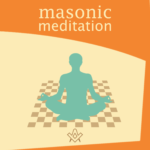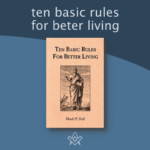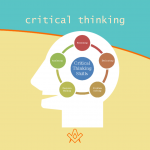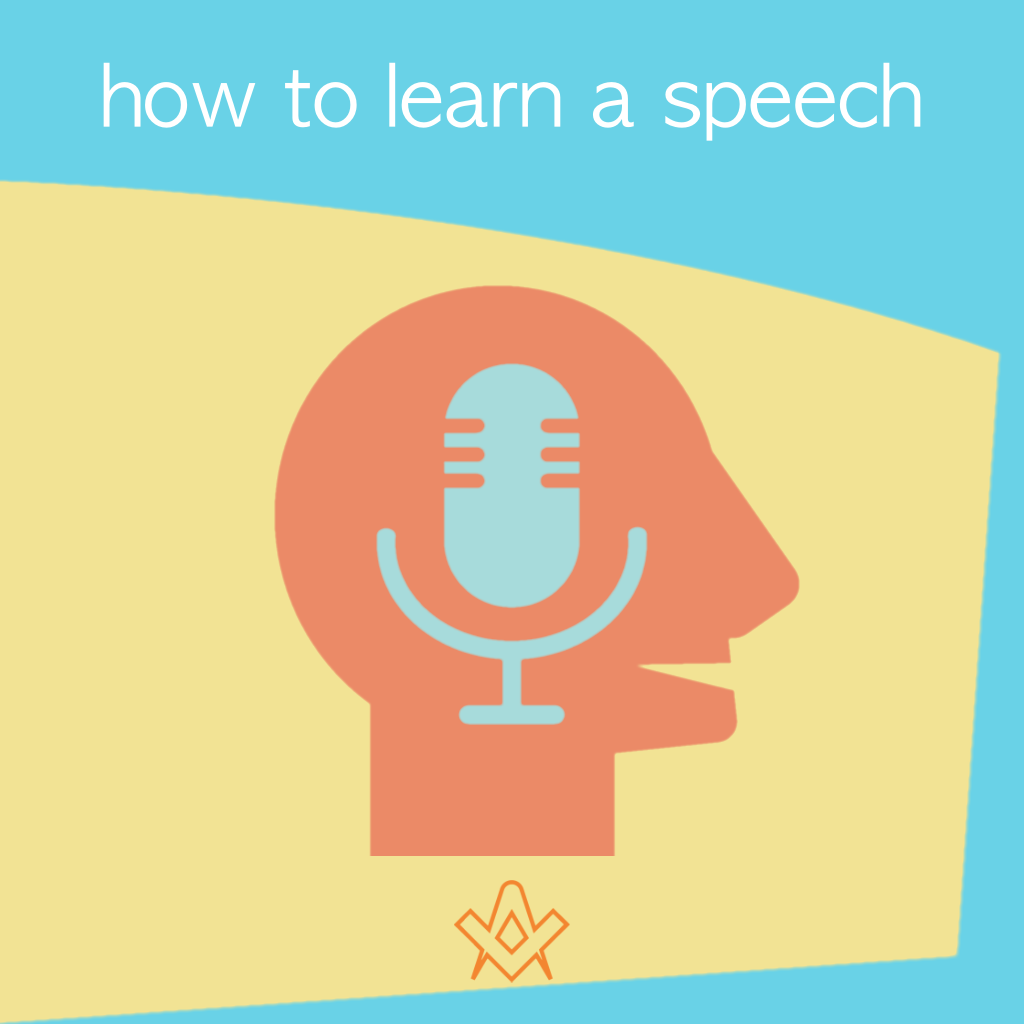Do you need to speak in public, and want (or have) to do it without notes ?
This article outlines my personal approach; like everything else, it won’t work for everyone – but I hope it will work for you.
There are broadly two different types of speech.
The first kind is memorised word-for-word; this should really only be necessary for actors, [Freemasons] and others in role-playing situations.
For everyone else, including presenters and after-dinner speakers, I recommend the second type; you only memorise the structure of your talk, through key words or phrases, then improvise around them.
This sounds much fresher and more spontaneous than a memorised speech and also gives you flexibility to make changes needed as you go along.

My approach to preparing both these types of speech begins with the “Link System” of memorisation, so let’s start with that.
Its basic use is to memorise a list of objects. Suppose you want to remember the following shopping list, in the order listed:
Potatoes
Sausages
Milk
Washing powder
Light bulbs
The key to all mnemonic systems (of which this is perhaps the simplest) is to make clear pictures in your mind, and to make them as outlandish as possible so they really stick in your memory.
So we begin with the first two objects on the list, and combine them together in a memorable image – perhaps a string of sausages with a large potato in the middle of the string.
We then make an image combining the second and third objects – maybe pouring out a carton of milk, but sausages come out through the hole instead of milk (actions help too).
This is then followed by images for the third & fourth and fourth & fifth objects.
In this way, you build up a chain; recalling the first object leads to the second, the second to the third and so on.
Let’s apply this system to the second type of speech, the more common kind.
First prepare your talk as a list of bullet points, then, for each point, highlight a key word that sums up the point for you.
This may not be an “object” that you can visualise; if so you’ll need to turn it into one, by choosing another word that sounds like it or reminds you of it in some other way.
Take the word “sound” for example; you could imagine an ear, a musical instrument, an echo-sounder, a strait….the choice is limited only by your imagination. And the effort of looking for a suitable image will help to impress the word on your mind.
You now have a list of words which you can link together as described above.
I suggest you add an extra one at the top of the list – a key word for the title of your talk.
Once you’ve memorised the list, recalling the title will bring back the whole chain of links.
Practise giving the speech, recalling each point in turn, and only looking at your outline if you forget the details.
You’ll be surprised how quickly you can dispense with the written outline.
My technique for a memorised speech is similar; highlight or underline (in pencil if it’s in a book) a key word for each phrase or sentence, list those keys, convert them into objects if necessary, then memorise them.
If it’s a long speech, I’d do one per sentence. You may find it helpful to type out the speech, or scan it, and then break it down with each phrase or sentence on a single line.
Now cover the page with a piece of paper and go through the speech uncovering it line by line, recalling your key word and as much as you can remember of the rest the next line before you uncover it.
I always read aloud through the whole speech at each run through, rather than trying to learn one line at a time; that way the whole thing “flows” in my mind and I get used to the sound of it, so if I say a wrong word or miss something out I immediately notice it.
As I said earlier, these techniques work for me, but that’s possibly because I think in words and find it comparatively easy to learn a speech by the way it sounds.
I can just about manage the key word images, though. If you think in pictures, you may be better off using a strongly visual technique like the Method of Loci – but that will have to be the subject of another article.
Article by: Barry Cooper

Barry Cooper is a past master of Goliath Lodge 5595, London, also a PZ of Goliath Chapter. He is also holds Senior London Grand Rank (Craft), ProvAGDC (Mark), ProvRAMGR DistGJD (AMD)
Barry is a keen amateur magician, and an Associate of The Inner Magic Circle, though he spends more time reading and writing about magic than performing it!
Barry has written for magic magazines and contributed to several books on magic.
He is a proof reader for The Magic Circular, The Magic Circle’s magazine, and has also written a number of books on magic and hypnosis. He received The Magic Circle’s Cecil Lyle Award 2017 for an article contributed to The Magic Circular.
His blog is at https://barrydcooper.wordpress.com/
Recent Articles: skills
 7 Soft Skills Taught In Freemasonry Discover how Freemasonry nurtures seven irreplaceable soft skills—collaboration; Communication, Teamwork, Empathy, Flexibility, Conflict Resolution, Active Listening, and Trustworthiness. Explore how these essential human attributes, grounded in emotional intelligence and ethical judgment, remain beyond the reach of AI. |
 Freemasonry and Reskilling in the age of AI The article explores the challenges and strategies organizations face in reskilling their workforce in the era of automation and artificial intelligence. It highlights the need for companies to view reskilling as a strategic imperative and involve leaders and managers in the process. The article also emphasizes the importance of change management, designing programs from the employee's perspective, and partnering with external entities. |
 Ten Central Commandments or Principles of Freemasonry Embrace the wisdom of Freemasonry's teachings in your personal journey towards self-improvement and stronger leadership. By upholding virtues of integrity, compassion, and respect, and uniting these with a commitment to continuous learning and social responsibility, inspire change. Transform yourself and the world around you, fostering a legacy of positivity and enlightenment. |
 Freemasonry: A Guide to Fatherhood In the sacred halls of Freemasonry, fathers discover a hidden power to transform their parenting journey. With its timeless values, supportive community, and life-enriching teachings, Freemasonry empowers fathers to provide a moral compass, foster self-improvement, build stronger connections, and embrace the confidence and wisdom needed to navigate the complex realm of fatherhood. |
 Courage as a core value in Freemasonry Freemasonry, a revered fraternity, prioritizes virtues like honesty and charity. However, courage is foundational. From Plato to Maya Angelou, courage is vital for other virtues. Freemasonry's teachings, referencing events like Gettysburg, emphasize diverse courage forms. In today's divided world, Masons promote and exemplify courage, understanding its importance in facing challenges. |
 How Freemasonry Cultivates Ideal Entrepreneurial Traits Freemasonry's cryptic rituals hold timeless lessons for building entrepreneurial greatness. Through tests of passion, vision and skill, Masonic teachings forge ideal traits like grit, creativity and alliance-making needed to seize opportunity and elevate enterprises. The right commitment unlocks code for entrepreneurial success. |
 What you see praiseworthy in others "What you see praiseworthy in others, carefully imitate, and what in them may appear defective, you will in yourself amend". This passage of Masonic ritual (Taylors Working, Address to the w |
 How to Learn Ritual with a Learning Disorder So what do you do when faced with that little blue book? Most Masons when first looking at the ritual book can understandably be fazed – the tiny print, the missing words, the questions and answers! Learning ritual can be a challenging task for anyone, especially individuals with learning disorders, but it is not impossible. Here are some tips to help make the process easier. |
 A "mind palace", also known as a "memory palace", is a technique for memorizing and recalling information. How would your life change if you could remember anything and everything? Discover the 'Mind Palace' and all will be revealed. |
 What is leadership and who does freemasonry help develop those skills needed to be a better leader |
 A story of the 'Ruffians' – those individuals whose paths cross ours, who feel entitled to seize and consume the property of others that they have not earned. A lesson to build character to be a better citizen of the world. |
 Now we are back in the Lodge room once again, maybe it is time to review how we learn and deliver ritual and look at different ways of improving that process. |
 Making an advancement in Masonic Knowledge can become far easier when you 'learn how to learn'. |
 Learn how to practise Masonic meditation in a busy world with all its care and employments |
 Struggling to learn your ritual? Become a 5-Minute Ritualist with the aid of a book of the same name. |
 Day in the life of a Freemason As we start a new year, maybe start it with a new habit? |
 Ten Basic Rules For Better Living Ten Basic Rules For Better Living by Manly P Hall |
 How can we use masonic leadership skills to avoid confrontational situations? |
 How the Trivium is applied to Critical Thinking - {who, what, where, when} - {how} - {why} |
 The Seven Liberal Arts - why 'seven', why 'liberal', why 'arts'? |
 How to improve your public speaking skill with 6 techniques |
 Do you need to speak in public, or present Masonic ritual without notes ? |
 What are logical Fallacies and how to spot them |
 Share one easy tip to learn masonic ritual; Some good tips from Facebook followers |
 How can we use the 7 secrets of the greatest speakers in history |
 What is a critical thinker and what are their characteristics? |
 Share one personal skill Freemasonry helped you to improve? How can we make practical use of the lessons taught in Masonic writings? |
 An introduction to the art of public speaking - speak with confidence |
 Seven Liberal Arts and Sciences What do you know about Seven Liberal Arts and Sciences |
 Three Words That Will Change Your Life This article discuss a common situation found in many lodges - a difficulty in holding a conversation with a stranger. |
 Al - Khwarizmi live c750 - c820 is credited as being the father of Algebra, being asked what is Man, give his answer in an algebraic expression |
masonic knowledge
to be a better citizen of the world
share the square with two brothers

click image to open email app on mobile device









